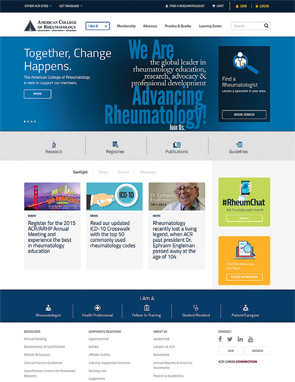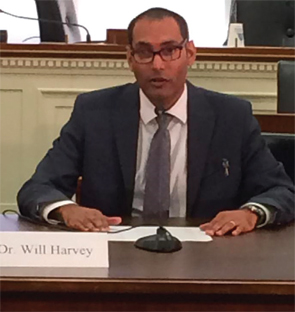
The ACR is leading rheumatology through a period of transformation.
Image Credit: Jirsak/shutterstock.com
As a practicing rheumatologist, I have experienced the increasing payer and government involvement shaping our evolving healthcare system. New payment models, changes in health insurance coverage, the federal mandate for the adoption of electronic health records and the implementation of ICD-10 are recent changes that have rocked our world. Our patients are also paying the price. Higher insurance premiums and co-pays, limitations in provider choice, and specialty-tier pricing systems requiring them to pay a percentage of the cost of expensive medications, are creating financial barriers for access to these potentially effective therapies.
Simultaneously, we are excited about the scientific progress in our specialty and the therapeutic breakthroughs for our patients. Advances in information technology are opening up avenues for integrating healthcare systems, improving the quality of care and engaging patients in their health.
However, the outlook is not all rosy in clinical practice. Rheumatologists are facing excessive administrative burdens from expanding payer and government regulations along with the depersonalization of the doctor-patient interaction brought about by the implementation of EHRs. No less consequential are the added costs practitioners face in adapting to these changes. How can providers ever expect to land on their feet?
The ACR Leads the Way …
Albert Einstein once said, “Life is like riding a bicycle. To keep your balance, you must keep moving.” The ACR has not slowed down, and in fact, has picked up the pace.
As president of the American College of Rheumatology, I have witnessed how the ACR, with its Board of Directors, committee chairs and hundreds of dedicated volunteers, is leading rheumatology through this period of transformation. When I talk about the ACR, it’s important to acknowledge the contribution of the members of the Association of Rheumatology Health Professionals (ARHP), a vital division of the ACR. Working together as a team is the only way the ACR will achieve its goals. As I reflect about my experience as president, let me tell you what is happening at the ACR and how it is impacting rheumatology.
… In Advocacy
The steady stream of government policies affecting our healthcare system has brought advocacy into the limelight as a key ACR strategy for ensuring that rheumatology has a voice in the political process. More than ever, rheumatologists must have a seat(s) at the table to question, participate in and propose policy, keeping in mind the best interests of rheumatology and our patients.
Although advocacy is a shared responsibility within the ACR, it is led by the Committee on Government Affairs (GAC) and supported by RheumPAC, the ACR’s political action committee.
This year, ACR advocates have enjoyed success at both the federal and state levels. Through the work of the ACR and its lobbyists as well as other professional societies, the Sustainable Growth Rate payment formula was finally repealed by the federal government and replaced in April 2015 by the Medicare Access and CHIP Reauthorization Act (MACRA). MACRA puts in place a five-year period of small, stable updates followed by value-based payment adjustments and, beginning in 2019, combines Meaningful Use, Value-Based Modifier and PQRS into a single payment program. We need to realize that MACRA gives the Centers for Medicare and Medicaid Services (CMS) significant leeway in implementing many aspects of the value-based adjustments over the next one to two years. The ACR is ramping up its efforts to influence these regulations by engaging a lobbying firm specializing in regulatory advocacy to complement its ongoing legislative lobbying activities.
In addition, two pieces of ACR-drafted legislation were introduced into Congress: H.R. 1600, Patients’ Access to Treatments Act, and H.R. 2247, the ICD-TEN Act, which was designed to provide a safe harbor period after ICD-10 implementation. The introduction of this latter piece of legislation prompted CMS to enact a 12-month safe harbor period after the Oct. 1 implementation of ICD-10, meaning that Medicare claims will not be denied or audited for reasons of ICD-10 diagnosis code specificity. This CMS ruling was a win for rheumatologists and other physicians and should help eliminate disruptions in payment.
The ACR’s advocacy efforts are expanding, too, at the state level through partnerships with 34 active Affiliate Societies, which have represented the interests of rheumatology in the passage of more than 10 new state laws related to the prescribing of biosimilars.
… In Practice Management
Because most of the new government policies and legislation have a direct impact on clinical practice, much of the work of the GAC has been in collaboration with the Committee on Rheumatologic Care (CORC). In the ACR, CORC serves as the clearinghouse for practice-related matters. Among its many activities, CORC is actively monitoring and evaluating changes to the physician fee schedule, relative value units and CPT coding. A key strategy last year was the submission of a code change proposal to modify the language for the biologic infusion codes.
CORC is also increasingly focused on insurance issues affecting rheumatologic care and is working toward strengthening relationships with insurance carriers and large self-insured companies to give rheumatologists a voice in their policy decisions. Working with CORC, the ACR staff helped rheumatologists prepare for the change from ICD-9 to ICD-10 coding by presenting more than 50 ICD-10 coding workshops to members and their staff nationwide.
… In Guidelines Development

The redesigned ACR website at is
positioning the College to better meet its members’ needs.
Rheumatologists are highly trained to determine the best treatment for their patients and should not allow other parties, such as payers, to define it for them. The development of treatment guidelines is the responsibility of the Committee on Quality of Care (QOC). This year, the ACR Board of Directors approved new guidelines for the treatment of polymyalgia rheumatica, axial spondyloarthritis and rheumatoid arthritis, and endorsed an important paper about the involvement of patients in guideline development.
As a member of the voting panel for the updated RA treatment guidelines, I can attest to the rigor of the GRADE (Grading of Recommendations Assessment, Development and Evaluation) methodology newly adopted by the QOC for the development of treatment guidelines. The QOC has also been evaluating the best way to efficiently produce and disseminate treatment guidelines and, with the approval of the ACR Board of Directors, took the first steps in bringing guideline development in house. In making this move, the ACR will be able to streamline guideline production and update guidelines whenever new evidence comes to light that may dictate a change in recommendations.
The QOC, in collaboration with CORC, also moved forward in its efforts to develop quality measures in rheumatology. Quality measures will be essential for assessing the process and outcome of rheumatologic care, which incidentally is part of the new Medicare merit-based incentive payment system, a result of MACRA.
… In Practice & Research Support
For several years, the ACR has been investing in the RISE (Rheumatology Informatics System for Effectiveness) Registry. RISE is envisioned to be a valuable resource for improving clinical practice and exploring research questions related to rheumatologic care. Quality measures, particularly those developed by QOC, will be built into RISE for use by its members. Currently, RISE is connected to 220 providers in 47 practices, and has accumulated more than 1 million encounters, including 300,000 visits attributable to 65,000-plus patients with RA. It has vast potential as a limitless source of valuable clinical data.
… In Workforce & Training Issues
The Committee on Rheumatology Workforce and Training Issues (COTW) is a nexus for many important college initiatives. Given the shortage of rheumatologists, the ACR needs a constant flow of information about its workforce to identify important trends that can inform decision making and planning for the future. To this end, the COTW has developed the 2015 workforce study survey, which I encourage you to take. It will update our understanding about the composition of the rheumatology workforce and enable the College to take action both inside and outside the organization to effect change.
The COTW in its oversight of fellowship training has also finalized the Entrustable Professional Activities, curricular milestones in the Next Accreditation System (NAS). The NAS is a restructuring effort by the Accreditation Council for Graduate Medical Education (ACGME) to focus training milestones on educational outcomes, reduce administrative burdens and encourage innovation and will be a welcome change for fellowship programs.
Given the shortage of rheumatologists, the ACR needs a constant flow of information about its workforce to identify important trends that can inform decision making & planning for the future.
Once initially certified, rheumatologists are obliged to participate in the Maintenance of Certification (MOC), which is administered by the American Board of Internal Medicine (ABIM). MOC has been a focus of ACR attention this year because of the dissatisfaction expressed by its members and physicians in general about the program. The ACR developed a position statement a few months ago based on a survey of its membership and made it available to the public. Our professional society, like others, has used strong language in expressing its displeasure with MOC and has taken up these concerns in meetings with ABIM leadership. As a result, the ABIM has recently announced that the unpopular 10-year secure exam may be on the way out. Other concerns expressed in the ACR’s position statement will be under review by the ABIM and its subspecialty boards. Rheumatologists should stay tuned for new developments in the MOC program, but I am cautiously optimistic.
… In Member Outreach

Government Affairs Chair Will Harvey, MD, MSc.
A major accomplishment this year has been the launch of the new ACR website. This re-architecture has been sorely needed to improve our online presence for members and the public. The new website represents a complete redesign, with major improvements in functionality, features and usability. Please check it out if you haven’t done so already. The site will enable the ACR better to address the diverse needs of its members and will provide a platform to introduce and promote the new Learning Management System, which will be the central hub for our online education.
Believe it or not, many ACR activities have been left out of this article because of limitations in space. If you are a member or volunteer, please forgive me for neglecting to mention the ACR activity of special interest to you. For me, the take-away message is that the ACR accomplished a lot this past year due to the dedication and commitment of many people.
Can rheumatologists land on their feet? The answer is yes, but finding the best place to land is like guessing the end of an unfinished novel. The outcome is subject to much speculation. In this shifting landscape, it will require forward thinking and learning through analysis and feedback. The ACR must continue to recruit volunteers and leaders with diverse skills who can help shape our future. Nobody should be satisfied with the status quo, and nobody should be surprised by the winds of change. If you see opportunities—good, then get involved. If you are unhappy about something—good, then get involved. Let’s keep moving to Advance Rheumatology!
Thank you for allowing me to serve the ACR and the interests of rheumatology.
 E. William St.Clair, MD, is president of the ACR and chief of the Duke Division of Rheumatology and Immunology. A rheumatologist, Dr. St.Clair has 25 years of experience as a clinical investigator. Contact him at [email protected].
E. William St.Clair, MD, is president of the ACR and chief of the Duke Division of Rheumatology and Immunology. A rheumatologist, Dr. St.Clair has 25 years of experience as a clinical investigator. Contact him at [email protected].
